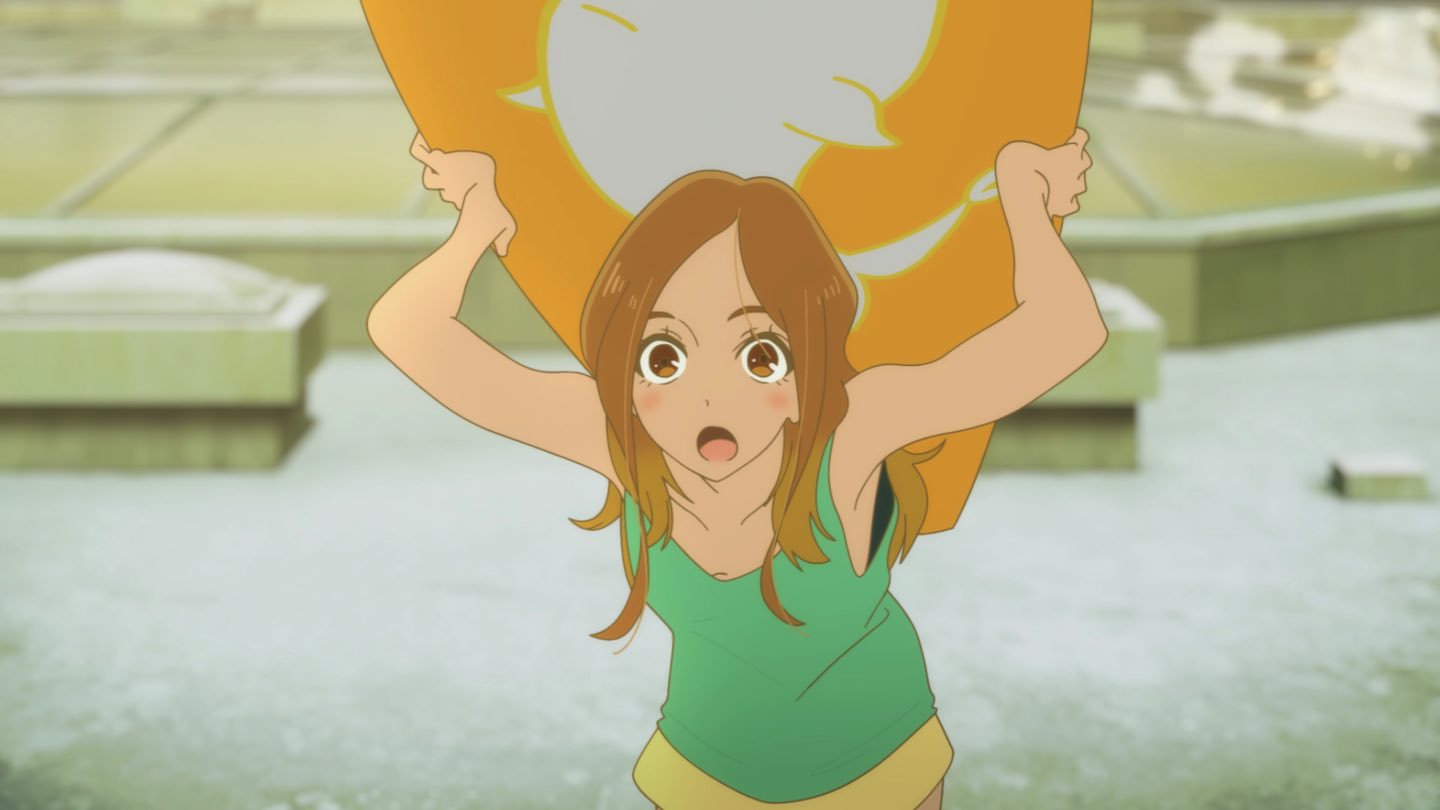
How do our loved ones support us, even in death?
With his latest film Ride Your Wave, director Masaaki Yuasa answers this question in an uncharacteristically “normal” way—as normal as a girl larping with a blow-up finless porpoise can be, anyway.
Since the release of his first film Mind Game (2004), Yuasa has garnered an almost Wes Anderson-like reputation of being a warped and aesthetically savvy king of whimsy. His productions, like Anderson’s, contain a toolkit of almost theatrical character designs and interesting misfits with fascinating problems. Over recent years, however, Yuasa has moved into slightly more mainstream territory, with Ride Your Wave as the most recent example. However, as we see in Ride Your Wave, mainstream doesn’t preclude quirkiness.
A Slip-Slide Summer Romance

Yuasa’s works have always tackled romance in unconventional ways. For instance, in Kemonozume (2006) and Kick-Heart (2012), Yuasa created interesting juxtapositions between monsters and monster hunters, and nuns and professional wrestlers, respectively. These whimsical themes have never taken away from the soul of his works, but rather, enhanced them. Bizarrely, Ride falls short on this front.
Written by Reiko Yoshida (Liz and the Blue Bird), Ride Your Wave explores the love story between Hinako Mukaimizu (Rina Kawaei), a college first-year and surfing aficionado, and Minato Hinageshi (Ryota Katayose), a firefighter who shares her love for the sea. Not long after Hinako moves into her new apartment, it catches on fire. All that’s well ends well though— Minato, paragon of executive function and the perfect boyfriend to end all boyfriends, immediately rescues her. It’s love at first sight, and the rest is history.
With quiet confidence, Yuasa establishes his titular couple’s meet-cute with rhythmic and emotional effect. Hinako and Minato grow closer in a montage of charming dates, relationship milestones, and vulnerable conversations. All of these scenes feel full of verisimilitude and packaged with the special kind of earnestness that one gets from falling in love for the first time. Yuasa takes special care to build upon Hinako and Minato’s love for surfing, and their shared favorite tune, Generation from Exile Tribe’s “Brand New Story.” Both of these elements become intensely important later. Yuasa’s eccentric touch, however, does not make Ride the transcendental love story that this film could have been.
Troubled Times at Sea

Ride Your Wave’s story takes a tragic turn when Minato, in trying to improve his surfing, ventures to the seaside alone and loses his own life while saving a drowning victim. Distraught, Hinako struggles to move on without her boyfriend and role model. From here, the film becomes a wacky meditation on learning how to let go.
The entire middle and final acts of the film feel oddly tongue-in-cheek. Hinako, and the viewer, get lost in an adventure devoid of pathos. Distraught by the death of her beau, Hinako hums “Brand New Story” and summons Minato’s spirit in whichever body of water she sings into. It appears that Minato’s soul cannot move on because Hinako cannot “ride her own wave” without him. She begins to rely on him even more so in death than she did in life. Hinako becomes delusional and amply creative in finding ways to share her life with Minato. She carries him around in a Thermos and an inflatable finless porpoise, and even goes as far as to seek counsel from him within the depths of a toilet bowl.
These montages, in true Yuasa spirit, feel undeniably weird. However, these odd flourishes—unlike those in his other works—detract from Ride Your Wave’s initially sincere tone. Hinako’s coping mechanisms don’t effectively show the aftershocks of grief as much as they pervert them. Instead of showing Hinako struggle with adulting (or you know, Minato’s actual “death”), Yuasa prefers to show her as a delusional goofball, dancing around with her Thermos and blow-up finless porpoise in public. In fact, we never see Hinako truly grieve until the film’s final moments. The use of “Brand New Story” as a summoning spell feels worse for this reason.
The goofy deviation is not a surprising move for Yuasa. While Yuasa’s style has made his eccentric oeuvre fun for film and anime connoisseurs, I can’t help but feel that Hinako’s delusions in Ride represent a major misstep. Music and eccentric coping mechanisms turn his heartful project into a funhouse—which creates a disconnect, because the audience knows that Hinako’s suffering is real and not a joke to her.
Strange Tides are Coming

With stronger storytelling, Ride Your Wave could easily become a summer masterpiece on-par with the likes of Weathering with You. Even if not a masterpiece though, Ride still surfs entertainingly on by as a colorful meditation on love, death, and self-discovery.
Yuasa fans can take comfort in knowing that writing for a mainstream audience has hardly dulled his shine. For all of his films’ narrative trappings, Yuasa will always have something interesting to say. Ride is most successful when it’s exploring the psyche of young adults in love; the film is a joy to dive into on a date or by yourself.
Is it sweet? Yes. Is it weird? Absolutely. Catch Ride Your Wave before the tides go down on February 19, 2020, at select theaters.
• • •
Ride Your Wave (Japanese: きみと、波にのれたら)—Japan. Dialog in Japanese. Directed by Masaaki Yuasa. First released June 10, 2019. Running time 1hr 36min. Voices by Ryota Katayose, Rina Kawaei, Honoka Matsumoto.
Ride Your Wave has a special US and Canada release on February 19, 2020. Click here for more information.
